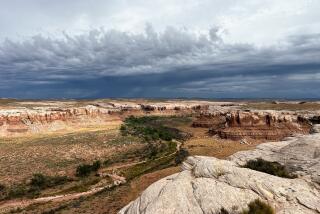Judge rejects federal desert management plan
A federal judge has rejected key provisions of a plan for managing millions of acres in the California desert, saying the U.S. Bureau of Land Management designated roughly 5,000 miles of off-road vehicle routes without properly taking into account their impact on public lands, archaeological sites and wildlife.
U.S. District Judge Susan Illston on Monday ruled that the West Mojave plan, which the bureau approved in 2006 after a decade of development, is “flawed because it does not contain a reasonable range of alternatives” to limit the number of miles of off-road routes.
She also determined that the bureau’s analysis of the routes’ impacts on air quality, soils, plant communities and sensitive species such as the Mojave fringe-toed lizard was inadequate, pointing out that the desert and its resources are “extremely fragile, easily scarred, and slowly healed.”
“The court recognizes the complexity of the issues presented in this case,” Illston said, “and that defendants have been given the difficult task of addressing the interests and needs of OHV [off-highway vehicle] recreationists while at the same time protecting listed species as required by law.”
The ruling came in response to a legal challenge brought in late 2006 by a coalition of conservation groups, including the Center for Biological Diversity, the Sierra Club, Public Employees for Environmental Responsibility and Desert Survivors.
The bureau’s “planning was backwards,” Elden Hughes of the Sierra Club said in a statement. “They should first analyze the resources, natural, cultural wildlife etc., and then plan the route network. They put the route approvals first.”
U.S. Atty. Charles R. Schockey, who represented bureau in the matter, declined to comment on the ruling. However, Illston said she plans to schedule a case management conference to discuss possible remedies.
The plan was designed to provide a comprehensive strategy to conserve and protect sensitive species and their habitats on public lands administered by the bureau, including the desert tortoise and Mojave ground squirrel.
“We believe the plan didn’t go far enough in terms of protecting resources,” said Lisa Belenky, an attorney with the Center for Biological Diversity. “Off-road-vehicle use in the west Mojave is very prevalent and increasing, so having the proper protections in place is very important.”
“We hope that in light of this decision,” Belenky added, “the bureau will rethink and limit the number of routes in these sensitive areas.”
--
More to Read
Sign up for Essential California
The most important California stories and recommendations in your inbox every morning.
You may occasionally receive promotional content from the Los Angeles Times.











